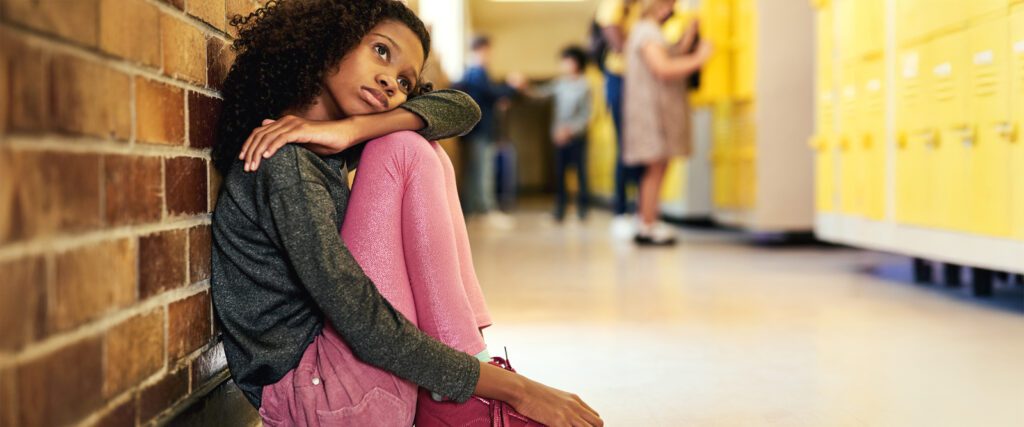A child psychologist explains why bullying happens, how to help your child if they are being bullied, and what to do if your child is bullying others.
Published November 12, 2025

When you think of bullying, the first thing that comes to mind may be a schoolyard bully throwing punches or the popular kids loudly excluding someone from their lunch table. But today, bullying has many different forms, especially with the rise of social media and screens.
“Bullies can use various approaches, but no matter what, their abuse is meant to belittle another person and escalate their own sense of power or social status in a group,” says Dr. Anne Marie Albano, director of the Center for Youth Mental Health at NewYork-Presbyterian.
Bullying can have negative effects on a young person’s mental health, self-esteem, and sense of safety, even years down the road. If you discover that your child is being bullied, it’s crucial to step in and have a conversation with them as soon as possible, Dr. Albano explains.
Health Matters spoke with Dr. Albano to learn more about the psychology behind bullying, how parents can support their child who is being bullied, and what to do if your child engages in bullying behavior.
What are some different forms of bullying?
Dr. Albano: Bullying is not the same as a conflict, disagreements, or even mean behavior. Bullying is persistent, intentional, and aggressive behavior — verbal or physical — towards another person, and not a one-off incident. There are three common forms:
Direct bullying involves a physical action or verbal assault of someone in person. This is the more “old-school,” face-to-face form of bullying that we often see in movies and TV shows. It can take the form of punching, kicking, or other physical abuse, as well as verbal threats and insults, all with the purpose of embarrassing and belittling someone.
Covert bullying is a more indirect form of bullying that often takes the form of exclusion and manipulation, and it may not be immediately obvious. Intentionally and continually leaving someone out of social activities, spreading rumors about them, and subtle mockery and passive aggressive comments are all forms of covert bullying.
Cyberbullying, or online bullying, has become more common, especially as more and more kids use screens and social media. Cyberbullying can overlap with covert bullying, and it can range from posting nasty comments, disparaging or embarrassing memes or photos, and spreading rumors about a person on social media to sending threatening and taunting text messages to someone.
 Dr. Anne Marie Albano
Dr. Anne Marie Albano
What are the longterm effects of bullying?
Being bullied can cause feelings of deep shame, fear, and helplessness. Unfortunately, other classmates may join in on the attacks or simply fail to stick up for the child who is being targeted. Some of their peers — even their friends — may distance themselves from the child who’s bullied because they don’t want the bully to target them, too. All of this can have a profound effect on self-esteem and self-image, especially when it happens in childhood, and it can lead to anxiety and depression in the long term.
It can even affect how bullying victims behave in friendships and relationships when they are older. The abusive behavior can become normalized to them, and they may struggle to assert themselves in the future.
What makes some children more susceptible to bullying?
Bullying can start very young, even in kindergarten. It becomes more common in times of transition, such as elementary to middle school, middle school to high school, and so forth.
Anyone can be a victim of bullying. Often, children and young adults can be bullied for anything that makes them seem “different,” whether it be they are new to the school, from a different religious or racial background, identify as LGBTQ+, or have a disability. Kids who are physically smaller or have delayed puberty, as well as those who are timid or introverted, may also be more likely to become the target of a bully.
For parents, what are some signs that may indicate their child is being bullied?
There are a few things to keep an eye out for:
A change in overall mood and attitude
No longer sharing about their social life and friends
Spending more time at home and in their room
Dropping out of activities and extracurriculars
School avoidance
More sensitive, irritable, or emotional than usual
Having trouble sleeping
Separation anxiety and clinging to parents (more common in very young children)
Obsessively checking their phone or social media, or suddenly avoiding screens altogether (can be indicative of cyberbullying)
How should parents talk to their child if they suspect their child is being bullied?
The first thing I recommend is checking in with your child and having an open conversation. Ask them how school is going, how they are feeling, and if anything is bothering them. If you’ve noticed that something is off with your child, but they don’t want to talk about it, then you can say something like, “I’ve noticed you’re spending a lot more time at home and you’ve dropped out of your extracurricular activities. Is there anything that might be causing that?”
No matter what they share, it’s important to listen and reflect without judging. Kids who are bullied are often afraid to talk about it, even with their parents, because they’re worried that they are going to be blamed for it somehow. You can respond with statements like, “That sounds really difficult,” but don’t tell them how they should feel or what you think they should have done in the moment.
If they reveal they have been bullied, ask them more questions about the situation, and then ask them how they’d like to handle it. It’s crucial that you emphasize that what is happening is not okay, and that while you understand their fear of standing up to the bully, you have to work together to figure out a way to stop this – especially because the bully may be hurting other kids, too.
It’s important to express to your child: “It’s not your fault. We all deserve to be safe, and you have nothing to be ashamed of.”
Once you have a conversation with your child, the next step is to make their teacher and principal aware of what is going on.
What should parents do if their child is bullying others?
At times, a child bullies others because they themselves have been bullied, or because they have routinely observed adults acting this way. A child may also bully others because they are seeking attention, struggling with insecurity, or because of difficulty managing their emotions.
It’s incredibly important to teach your child empathy from a young age. Parents should model kindness towards others and set an example of how to express emotions in a calm, healthy way.
If you find out that your child is bullying others, sit with your child and understand what is causing this behavior. You can say something like, “We heard that you hurt one of your classmates. Why did you do that?” Listen to them, and then immediately emphasize that this behavior is unacceptable. Your child has to understand that there are consequences to their bullying, such as meeting with the principal, making amends with the child that they bullied, or even facing a suspension from school.
Parents of children who have engaged in bullying should not feel ashamed. Instead of trying to cover it up or turning a blind eye, they should address it head on and be proactive in getting their child help.
Whether your child is the victim of a bully, or they are the bully, consulting a mental health professional for guidance on how to respond, as well as getting therapy for your child, can help to stop the bullying, address the immediate emotional needs of your child, and put them back onto a path of healthy and secure development.
At A Glance
Featured Expert
